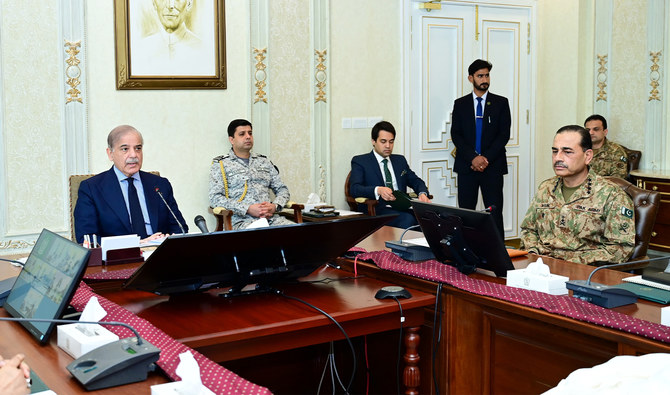ISLAMABAD: A high-level security meeting chaired by Prime Minister Shehbaz Sharif on Wednesday called for a regional approach to tackle militant violence in the country, just a day after a suicide bomber killed five Chinese nationals and their local driver in Pakistan’s northwest.
The increase in militant activities followed the November 2022 breakdown of a ceasefire between the government and the banned network Tehreek-e-Taliban Pakistan (TTP), whose leadership is reportedly based in neighboring Afghanistan.
Since then, Pakistan witnessed a spike in deadly attacks on civilians and security forces, especially in the Khyber Pakhtunkhwa and Balochistan provinces, resulting in hundreds of fatalities.
The attacks on Chinese workers, engaged in critical regional connectivity and infrastructure development projects, have heightened the concern for Pakistani authorities, given the diplomatic sensitivities and the importance of these projects to Pakistan’s struggling economy.
The prime minister offered his condolences to the families of the victims of the recent attack in Shangla during the meeting and assured them that the perpetrators of the violent act would be brought to justice.
“Terrorism is a transnational threat that has been instrumentalized by the enemies of Pakistan to stymie Pakistan’s progress and development,” an official statement released after the meeting quoted him as saying.
“The acts targeting Pakistan-China friendship are particularly aimed at creating mistrust between the two iron brothers.”
“The participants expressed serious concerns over sanctuaries available to terrorists across the borders and emphasized upon the need for a regional approach for countering terrorism,” it added.
The emergency meeting in the aftermath of the militant attack on Chinese nationals working on Dassu Hydel Power Project was also attended by members of the federal cabinet, army chief, provincial chief ministers and inspector generals of police.
During the meeting, Chief of Army Staff General Asim Munir reiterated the resolve of the armed forces of Pakistan to eliminate the militancy, pointing out that the country had successfully fought a bruising battle against armed groups for nearly two decades.
“We shall fight terrorism till every terrorist casting an evil eye on Pakistan, its people and their guests, is eliminated,” he said.
“We shall not leave any stone unturned to ensure that every foreign citizen, especially the Chinese nationals, contributing to the prosperity of Pakistan, is safe and secure in Pakistan.
We shall fight terrorism with all our might, to the very end.”
Media reports indicate that Pakistani authorities will perform DNA testing on the remains of the suicide bomber involved in the Shangla attack.
A Chinese team of experts is also expected to arrive in Pakistan to conduct an independent investigation and also collaborate with the Pakistani law enforcement units.












